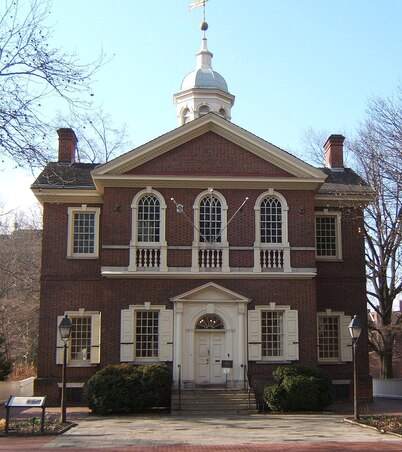 Carpenter's Hall -- Meeting Place of the First Continental Congress
Carpenter's Hall -- Meeting Place of the First Continental Congress Benjamin Franklin had put forth the idea of such a meeting the year before, but he was unable to convince the colonies of its necessity until the British Navy instituted a blockade of Boston Harbor and Parliament passed the punitive Intolerable Acts in 1774 in response to the Boston Tea Party. During the congress, delegates organized an economic boycott of Great Britain in protest and petitioned the King for a redress of grievances. The colonies were united in their effort to demonstrate to the mother country their authority by virtue of their common causes and their unity; but their ultimate objectives were not consistent. Most delegates were not yet ready to break away from Great Britain, but they most definitely wanted the king and parliament to act in what they considered a fairer manner. Delegates from the provinces of Pennsylvania and New York were given firm instructions to pursue a resolution with Great Britain. While the other colonies all held the idea of colonial rights as paramount, they were split between those who sought legislative equality with Britain and those who instead favored independence and a break from the Crown and its excesses.
The primary accomplishment of the First Continental Congress was a compact among the colonies to boycott British goods beginning on December 1, 1774, unless parliament should rescind the Intolerable Acts. While delegates convened in the First Continental Congress, fifty-one women in Edenton, North Carolina formed their own association in response to the Intolerable Acts that focused on producing goods for the colonies. Additionally, Great Britain's colonies in the West Indies were threatened with a boycott unless they agreed to non-importation of British goods. Imports from Britain dropped by 97 percent in 1775, compared with the previous year. Committees of observation and inspection were to be formed in each Colony to ensure compliance with the boycott. It was further agreed that if the Intolerable Acts were not repealed, the colonies would also cease exports to Britain after September 10, 1775.
The Houses of Assembly of each participating colony approved the proceedings of the Congress, with the exception of New York. The boycott was successfully implemented, but its potential for altering British colonial policy was cut off by the outbreak of hostilities in April 1775. Congress also voted to meet again the following year if their grievances were not addressed satisfactorily. Anticipating that there would be cause to convene a second congress, delegates resolved to send letters of invitation to those colonies that had not joined them in Philadelphia, including: Quebec, Saint John's Island, Nova Scotia, Georgia, East Florida, and West Florida.[ Of these, only Georgia would ultimately send delegates to the next Congress.
 RSS Feed
RSS Feed